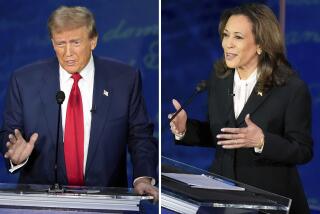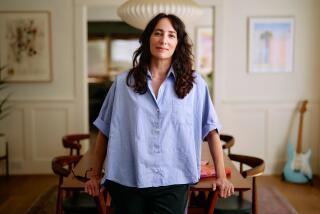Rachel Dolezal throws doubt on her biological parents: ‘I haven’t had a DNA test’
Rachel Dolezal’s daylong media blitz in which she denied that she is a white woman posing as black culminated Tuesday night with a claim that she’s not sure her white parents are her real parents.
“I haven’t had a DNA test. There’s been no biological proof that Larry and Ruthanne are my biological parents,” Dolezal said in an appearance on “NBC Nightly News.”
“There’s a birth certificate that has your name on it and their names on it,” interviewer Savannah Guthrie responded.
“I’m not necessarily saying that I can prove they’re not,” Dolezal said. “But I don’t know that I can actually prove they are. I mean, the birth certificate is issued a month and a half after I’m born. And certainly there were no medical witnesses to my birth.”
Live discussion at 12:30 p.m. PT: What defines race?
Earlier Tuesday, Dolezal, a former Spokane, Wash., NAACP leader, said she had viewed herself as black since childhood and knows what it’s like to “live black,” despite critics’ allegations she is a poseur.
In back-to-back interviews with NBC’s “Today” show and MSNBC on Tuesday morning, Dolezal did not offer any apologies and said she was being attacked in a “viciously inhumane way” even as she remained committed to fighting for human rights.
Dolezal also denied switching racial identities for opportunistic reasons, even though she sued Howard University for allegedly discriminating against her when she was a white graduate student there, and years later described herself as black on job applications.
“I identify as black,” a composed, smiling Dolezal said during a 10-minute interview on “Today,” less than 24 hours after she had resigned as president of the NAACP’s Spokane chapter.
Dolezal, 37, said she hoped the passions aroused by the episode would be channeled into a deeper conversation on ethnicity and race.
“The discussion really is what it is to be human,” she said.
Asked if she would again make the same choices that led to the uproar, Dolezal replied: “I would.”
“I have really gone there with the experience, in terms of being a mother of two black sons and really owning what it means to experience and live black, blackness,” she said later on MSNBC when asked what it meant to identify herself as black.
Dolezal added that she had felt isolated at a young age, as she grew to feel a connection with black people. “Just the black experience, and wanting to celebrate that,” she said.
“But certainly that was shut down,” Dolezal added. “I was socially conditioned to not own that and to be limited to whatever biological identity was thrust upon me and narrated to me.”
She said that when her parents adopted four younger black children, she saw herself as a helpful link between the children and their new, mainly white environment.
The controversy erupted Friday, when Dolezal’s parents said their daughter is white and produced photographs of her from years ago. The pictures show Dolezal with fair skin and straight, blond hair, with coloring similar to that of her mother and father.
On “Today,” Dolezal looked at one of the pictures, which she said was taken when she was about 16. She said that people looking at it would identify her as white in the photograph, and Dolezal said that she was not publicly identifying herself as African American at the time the picture was taken.
But Dolezal also said that she had thought of herself as black since about the age of 5.
“I was drawing self-portraits with the brown crayon instead of the peach crayon,” she said.
Her parents denied that claim in their own appearance on Fox News on Tuesday morning.
“That is a fabrication. That’s false. That did not happen. She has never done anything like that as a child, although she was always attracted to the black people,” Ruthanne Dolezal said on Fox News, noting that the family had close African American friends. “She was used to relating to people of diversity. But she did not ever portray herself [as black].”
Larry Dolezal said “we don’t know” why their daughter was portraying herself as black, adding that Rachel had told them over the years not to contact her.
Years later, when Dolezal emerged as a civil rights activist in northern Idaho, she said news stories began describing her as biracial or mixed-race, and she did not correct them.
By then, Dolezal’s skin was noticeably darker, and she wore her hair in braids or tightly wound curls.
“I certainly don’t stay out of the sun,” she replied when asked if she had done something to change her skin color.
Dolezal did not say why in years past she chose not to correct the news stories that described her as biracial.
She was asked why she had publicly identified a black man as her father while working in Spokane for the NAACP, and whether it was done to bolster her reputation as a black activist.
In response, Dolezal said she and the man had connected “on a very intimate level, as a family,” and she again described him as her “dad.”
“Every man can be a father. Not every man can be a dad,” said Dolezal, whose birth parents say she has shunned them for years.
“That hurts deeply because for over 20 years, Rachel fondly referred to me as ‘papa,’ ” Larry Dolezal said on Fox News, responding to his daughter’s remark.
“This is an issue not just of identity but also of integrity. As much as we are hurt as parents, we are also very alarmed by the level of dishonesty that Rachel is exhibiting,” Ruthanne Dolezal added.
Dolezal denied that she had adopted her racial identity for opportunistic reasons and cast herself as the victim of a difficult life – something her parents have denied.
“My life has been one of survival, and the decisions I have made along the way, including my identity, have been to survive and to carry forward in my journey,” said Dolezal. Those decisions include suing Howard University, a historically black school in Washington, D.C., when she was a graduate student there, alleging she was discriminated against for being white.
Asked about the lawsuit, which was dismissed, Dolezal said she filed it after being told that she was losing a scholarship and teaching assistant job at Howard because other people needed help more than she did and that as a white woman, she probably had relatives to help her financially.
Lower and upper courts alike dismissed Dolezal’s claims of discrimination. A Howard University spokeswoman declined to comment on Dolezal’s lawsuit, calling the matter resolved.
Larry Dolezal said he heard Howard University officials didn’t know Dolezal was white when they awarded her a full-ride scholarship years ago.
“They see her art portfolio was all African American [portraiture], and then she shows up two weeks before — and the way I recall this being reported back to us at that time was — when she walked in to finalize her registration a week or two before classes started, eyes were popping, jaws were dropping, because they couldn’t believe they awarded a full-ride scholarship to a white woman,” Larry Dolezal said.
“This is not some freak ‘Birth of a Nation’ mockery blackface performance,” Dolezal said on the “Today” show, denying some critics’ allegations that what she did is akin to a white performer donning a crude blackface disguise.
In additional portions of the interview aired Wednesday morning on “Today,” Dolezal admitted to one fabrication about her past: she was not born in a tepee in South Africa.
“That is definitely a misrepresentation that I will own. I have never been to South Africa,” she said.
As for where she was born, Dolezal said, “I wasn’t born in a tepee that I know of.”
She did not explain why she had made those claims in the past.
She said her two sons are among her staunchest supporters. One of them is one of the four black children her parents adopted; Dolezal says she later was given custody of the young man. The other is the son she had with her ex-husband, Kevin Moore, who is black.
“I actually was talking to one of my sons yesterday and he said, ‘Mom, racially you’re human and culturally you’re black,’” she said as the sons stood offstage. Neither of them joined the interview.
Dolezal said she had anticipated going public with her background at some point.
“Clearly, I wasn’t expecting it to be thrust upon me right now,” she said.
Susman reported from New York and Pearce from Los Angeles.
Follow @TinaSusman and @MattDPearce for national news
ALSO:
James Holmes disclosed homicidal thoughts but not a plan, psychiatrist says
What went wrong at Gap? One of the ugliest dresses ever was a clue
It’s legal to smoke pot in Colorado, but you can still get fired for it
More to Read
Sign up for Essential California
The most important California stories and recommendations in your inbox every morning.
You may occasionally receive promotional content from the Los Angeles Times.












